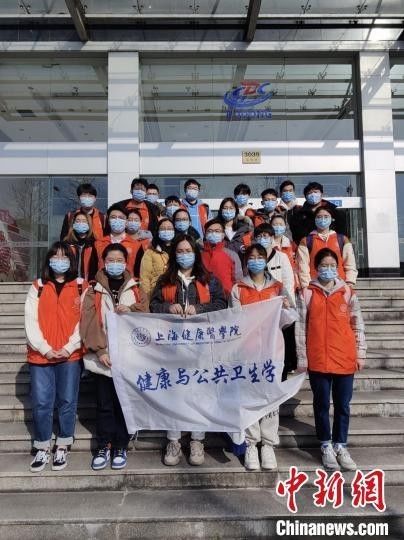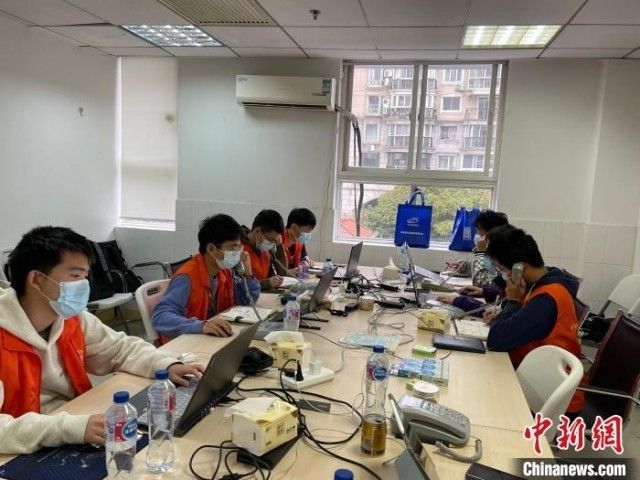
Student volunteers from the School of Health and Public Health of Shanghai Health Medical College completed a total of about 1,250 confirmed cases. Photo courtesy of Shanghai Health Medical College
China News Service, Shanghai, April 18 (Reporter Chen Jing) Under the epidemic prevention and control, epidemiological investigation tasks are heavy. The reporter learned on the 18th that the students of Shanghai colleges and universities have become volunteers, “retrograde” in the disease control department and online, busy with epidemic risk prevention and control, information reporting, health control, epidemiological investigation…
In 38 days, the student volunteers from the School of Health and Public Health, Shanghai Health Medical College completed a total of about 1,250 confirmed cases, a total of about 6,120 close cases, and were transferred to other areas. A total of about 10,450 times, a total of about 4,050 times for the second close-contact audit, about 115,300 times for close-contact and sub-close contact dispatch, 69,540 person-times were entered in the preliminary screening of the national system, and a total of 550 people were transferred from other provinces.
The school told reporters that with the increase in the number of confirmed cases and asymptomatic infections in Shanghai, the pressure on the Pudong New Area Center for Disease Control and Prevention is also increasing day by day. The school’s School of Health and Public Health issued a volunteer recruitment notice, which received an enthusiastic response from the students. After the professional training of the disease control department, the college student volunteers “went to work”. Wang Shiying, a 20th-level public utility management (undergraduate) class, told reporters that as a volunteer for telephone dispatching, her mind went blank when she first conducted telephonic dispatching. However, she soon entered the state. “Hello, this is Pudong CDC, who are you…” “Have you been to…” “Please wear your mask and go home immediately, don’t take public transportation, don’t be nervous, and wait at home for work with peace of mind The personnel contact you…” This is the most frequent words she has said recently.

After the professional training of the disease control department, the college student volunteers have “taken jobs”. Photo courtesy of Shanghai Health Medical College
With the improvement of people’s anti-fraud awareness, questions from those who are transferred are encountered every day. Wang Shiying said: “‘Learning how to quickly make people believe in us’ has become a compulsory course. After a few days of phone calls, the volunteers had a big discussion on ‘how to quickly gain the trust of the people being transferred’ and concluded. After a few experiences, this feeling is quite amazing.”
During the interview, the reporter learned that volunteer Shi Yijun had an “anti-epidemic diary”, which was filled with “worries” – “I wonder if the old couple waiting for the transfer has eaten? “The sister who learned that she was a close contact cried very sad. Can our work help her?” “A factory has a confirmed diagnosis. How many people’s lives will be disrupted by the sudden epidemic?” revealed by the interviewee Information left young volunteers worried.
Jiang Yijin, a volunteer of the dispatch group, told reporters that the task of his group is to assign close contacts to the corresponding communities for management. She said: “We strive to confirm the information quickly and accurately, and assign it to the corresponding community in a timely manner for management and control. For special groups, we will inform the community in detail about their situation and make notes, and special cases will be dealt with, and we will try our best to take care of them. Everyone’s feelings, this is the best we can do to help them.”

Volunteer Shi Yijun has an “anti-epidemic diary”, which is full of “worries” recorded in the diary. Photo courtesy of Shanghai Health Medical College
The volunteers at the CDC in Pudong New Area put themselves into intense work every morning, “Everyone’s work must be carried out carefully, and our little negligence may put more people at risk. “Before work starts, Zhao Weihang always reminds his classmates.
Starting from April 6, some volunteers started the second stage of expedited work – inputting the information of persons with abnormal nucleic acid screening in the relevant national system. Information screening and data entry must be completed before 11 o’clock that night. , the work task is heavy, the pressure is high, and the intensity is high. Zhao Weihang said: “We have to face thousands of pieces of data every day. Not only do we need to quickly identify them, but we also need to double-check them after they are entered. The new work system needs to log in again if it is not in operation for a period of time. They are all immersed in the information input, and I feel like a waste of time to eat a meal or go to the toilet.” In ten days, college student volunteers entered 66,428 pieces of data, entered and dynamically updated through identity information, nucleic acid test results and abnormal conditions. , screening and comparison, providing accurate data support for epidemic prevention and control. (End)